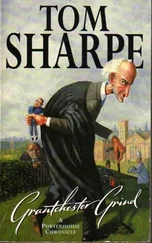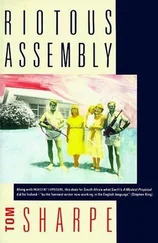Tom Sharpe - Blott on the Landscape
Здесь есть возможность читать онлайн «Tom Sharpe - Blott on the Landscape» весь текст электронной книги совершенно бесплатно (целиком полную версию без сокращений). В некоторых случаях можно слушать аудио, скачать через торрент в формате fb2 и присутствует краткое содержание. Жанр: Современная проза, на английском языке. Описание произведения, (предисловие) а так же отзывы посетителей доступны на портале библиотеки ЛибКат.
- Название:Blott on the Landscape
- Автор:
- Жанр:
- Год:неизвестен
- ISBN:нет данных
- Рейтинг книги:5 / 5. Голосов: 1
-
Избранное:Добавить в избранное
- Отзывы:
-
Ваша оценка:
- 100
- 1
- 2
- 3
- 4
- 5
Blott on the Landscape: краткое содержание, описание и аннотация
Предлагаем к чтению аннотацию, описание, краткое содержание или предисловие (зависит от того, что написал сам автор книги «Blott on the Landscape»). Если вы не нашли необходимую информацию о книге — напишите в комментариях, мы постараемся отыскать её.
Blott on the Landscape — читать онлайн бесплатно полную книгу (весь текст) целиком
Ниже представлен текст книги, разбитый по страницам. Система сохранения места последней прочитанной страницы, позволяет с удобством читать онлайн бесплатно книгу «Blott on the Landscape», без необходимости каждый раз заново искать на чём Вы остановились. Поставьте закладку, и сможете в любой момент перейти на страницу, на которой закончили чтение.
Интервал:
Закладка:

Tom Sharpe
Blott on the Landscape
To Geoff Millard
Chapter 1
Sir Giles Lynchwood, Member of Parliament for South Worfordshire, sat in his study and lit a cigar. Outside his window tulips and primroses bloomed, a thrush pecked at the lawn and the sun shone down out of a cloudless sky. In the distance he could see the cliffs of the Cleene Gorge rising above the river.
But Sir Giles had no thoughts for the beauties of the landscape. His mind was occupied with other things; with money and Mrs Forthby and the disparity between things as they were and things as they might have been. Not that the view from his window was one of uninterrupted beauty. It held Lady Maud, and whatever else she might be, nobody in his right mind would ever have described her as beautiful. She was large and ponderous and possessed a shape that someone had once aptly called Rodinesque – certainly Sir Giles, viewing her as dispassionately as six years of marriage allowed, found her monumentally unattractive. Sir Giles was not particularly fussy about external appearances. His fortune had been made by recognizing potential advantage in unprepossessing properties and he could justly claim to have evicted more impecunious tenants than any other anonymous landlord in London. Maud’s appearance was the least of his marital problems. It was rather the cast of her mind, her outspoken self-assurance, that infuriated him. That, and the fact that for once in his life he was lumbered with a wife he could not leave and a house he could not sell.
Maud was a Handyman and Handyman Hall had always been her family home. A vast rambling building with twenty bedrooms, a ballroom with a sprung floor, a plumbing system that held fascinations for industrial archaeologists but which kept Sir Giles awake at night, and a central heating system that had been designed to consume coke by the ton, and now seemed to gulp oil by the megagallon, Handyman Hall had been built in 1899 to make manifest in bricks, mortar and the more hideous furnishings of the period the fact that the Handyman family had arrived. Theirs had been a brief social season. Edward the Seventh had twice paid visits to the house, on each occasion seducing Mrs Handyman in the mistaken belief that she was a chambermaid (a result of the diffidence which left her speechless in the presence of Royalty). In recompense for this royal gaffe, and for services rendered, her husband Bulstrode was raised to the Peerage. From that brief moment of social acceptance the Handymans had sunk to their present obscurity. Borne to prominence on a tide of ale – Handyman Pale, Handyman Triple XXX, and Handyman West Country had been famous in their time – they had succumbed to a taste for brandy. The first Earl of Handyman had died, a suspicious husband and an understandably ardent republican, in time to achieve posthumous fame as the first cadaver to incur Lloyd George’s exorbitant death duties. He had been followed almost immediately by his eldest son Bartholomew, whose reaction to the taxman’s summons had been to drink himself to death on two bottles of his father’s Trois Six de Montpellier.
The outbreak of the First World War had completed the decline in the family fortunes. Boothroyd, the second son, had returned from France with his taste buds so irreparably impaired by taking a swig from a bottle of battery acid to steady his nerves before going over the top that his efforts to restore Handyman Ale to its pre-war quality and popularity had quite the contrary effect. For the first time the title “Brewers Extraordinary to his Majesty the King” accurately reflected the character of the beer dispensed by the Handyman Brewery. During the twenties and thirties sales dropped until they were confined to a dozen tied houses in Worfordshire whose patrons were forced to consume Boothroyd’s appalling concoctions out of a sense of loyalty to the family and by the refusal of the local magistrates (Boothroyd among them) to grant licences to sell spirituous liquors to anyone else. By that time the Handymans had been reduced to living in one wing of the great house and had celebrated the outbreak of the Second World War by offering the rest of their home to the War Office. Boothroyd had died on Home Guard duty to be succeeded by his brother Busby, Maud’s father, and the Hall had served first as a home for General de Gaulle’s chief of staff and the entire Free French Army of that time and later as an Italian prisoner-of-war camp. The fourth Earl had done what he could to restore Handyman Ale to its previous popularity by reverting to the original recipe, and to restore the family fortune by using his influence to see that the War Office paid a quite disproportionately high rent for a building they didn’t want.
It had been that influence, the Handyman influence, which had persuaded Sir Giles that he could do worse than marry Lady Maud and through her acquire a seat in Parliament. Looking back over the years Sir Giles was inclined to think that he had paid too high a price for the Hall and social acceptance. A marriage of convenience he had called it at the time, but the term had proved singularly inappropriate. Nothing about Maud’s appearance had suggested an unduly fastidious attitude to sex and Sir Giles had been surprised, not to say pained, by her too literal interpretation of his suggestion on their honeymoon that she should tie him to the bed and beat him. Sir Giles’ screams had been audible a quarter of a mile along the Costa Brava and had led to an embarrassing interview with the hotel manager. Sir Giles had stood all the way home and ever since had sought refuge in a separate bedroom and in Mrs Forthby, in whose flat in St John’s Wood he could at least be assured of moderation. To make matters worse there was no possibility of a divorce. Their marriage settlement included a reversionary clause whereby the Hall and the Estate, for which he had had to pay one hundred thousand pounds to Maud, would revert to her in the event of his death without heirs or of misconduct on his part leading to a divorce case. Sir Giles was a rich man but one hundred thousand pounds was too high a price to pay for freedom.
He sighed and glanced out of the window. Lady Maud had disappeared but the scene was no pleasanter for her going. Her place had been taken by Blott, the gardener, who was plodding across the lawn towards the kitchen garden. Sir Giles studied the squat figure with distaste. For a gardener, for an Italian gardener and an ex PoW, Blott had an air of contentment that grated on Sir Giles’ nerves. He liked his servants to be obsequious and there was nothing obsequious about Blott. The wretched fellow seemed to think he owned the place. Sir Giles watched him disappear through the door in the wall of the kitchen garden and considered ways and means of getting rid of Blott, Lady Maud and Handyman Hall. He had just had an idea.
So had Lady Maud. As she lumbered about the garden, uprooting here a dandelion and there a chickweed, her mind was occupied with thoughts of maternity.
“It’s now or never,” she murmured as she squashed a slug. Between her legs she could see Sir Giles in his study and wondered once again why it was that she should have married a man with so little sense of duty. In her view there was no higher virtue. It was out of duty to her family that she had married him. Left to herself she would have chosen a younger, more attractive man, but young attractive men with fortunes were in short supply in Worfordshire and Maud too plain to seek them out in London.
“Coming out?” she had shouted at her mother when Lady Handyman had suggested she should be presented at court. “Coming out? But I’ve already been.”
Читать дальшеИнтервал:
Закладка:
Похожие книги на «Blott on the Landscape»
Представляем Вашему вниманию похожие книги на «Blott on the Landscape» списком для выбора. Мы отобрали схожую по названию и смыслу литературу в надежде предоставить читателям больше вариантов отыскать новые, интересные, ещё непрочитанные произведения.
Обсуждение, отзывы о книге «Blott on the Landscape» и просто собственные мнения читателей. Оставьте ваши комментарии, напишите, что Вы думаете о произведении, его смысле или главных героях. Укажите что конкретно понравилось, а что нет, и почему Вы так считаете.












